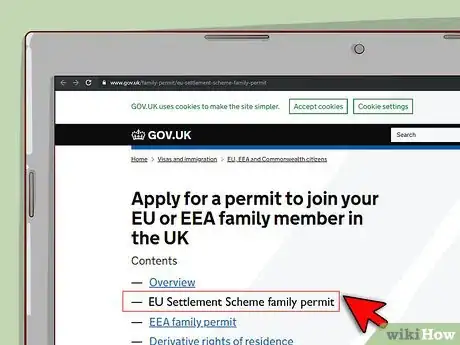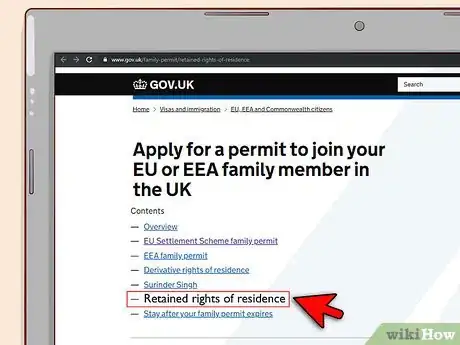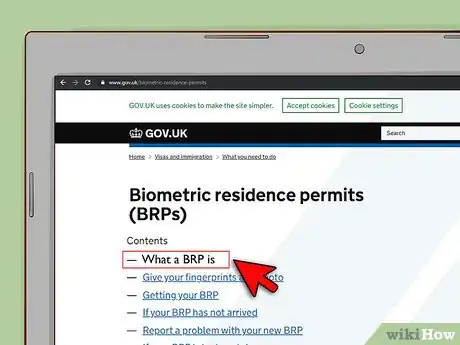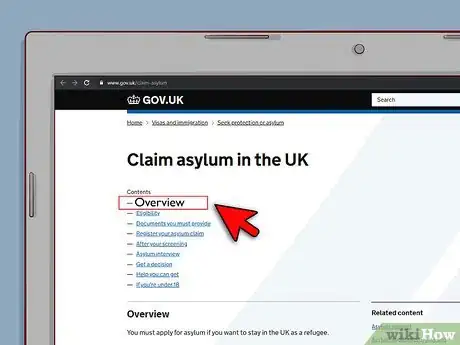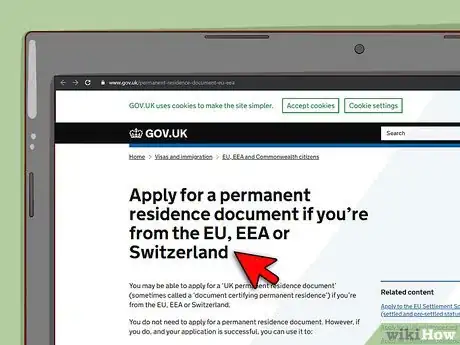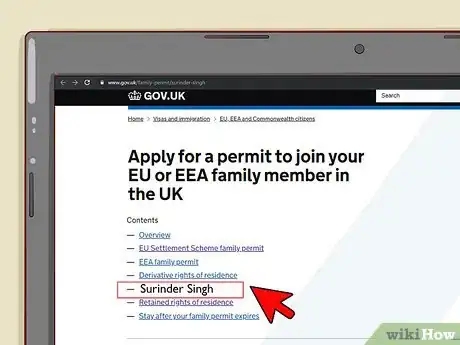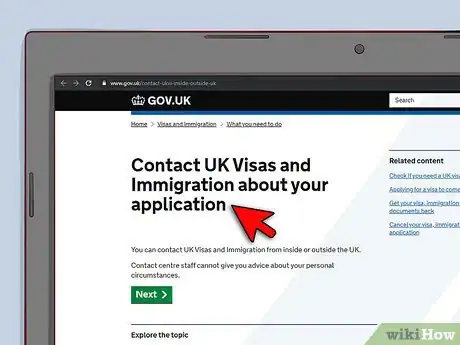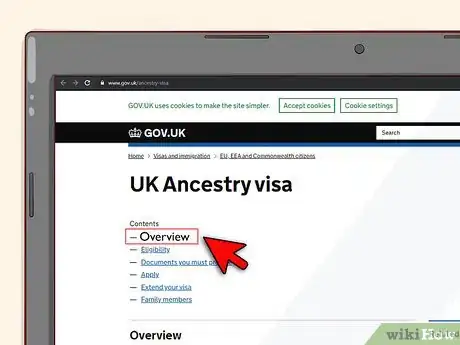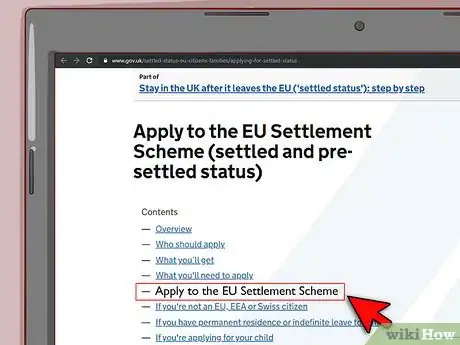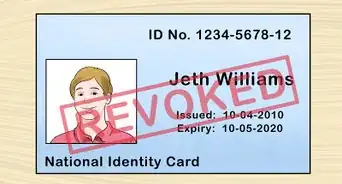This article was co-authored by wikiHow Staff. Our trained team of editors and researchers validate articles for accuracy and comprehensiveness. wikiHow's Content Management Team carefully monitors the work from our editorial staff to ensure that each article is backed by trusted research and meets our high quality standards.
There are 17 references cited in this article, which can be found at the bottom of the page.
This article has been viewed 13,912 times.
Learn more...
The United Kingdom is a culturally and environmentally diverse country that is, for many, a very desirable place to live. Becoming a UK resident allows you to live, work, and study in the UK without the usual immigration restrictions while still holding foreign citizenship.[1] If you’re not an EEA or Swiss national, the type of residency you can obtain will depend on your relatives, your specific reasons for wanting to live in the UK, and your home country. If you are a European Economic Area (EEA) or Swiss national, you can become a UK resident by living in the UK and participating in qualifying activities, or by living with a British citizen as a relative or caretaker.
Steps
Becoming a Resident as a Non-EEA National
-
1Apply for a family permit to get settlement status. If you have a close or extended relative who is an EEA or Swiss national who has gotten settlement status and has been living in the UK for at least 6 months, you can first become a short-term resident with a family permit.[2] Then, after 6 months of residency with a family permit, you will be able to apply to the EU Settlement Scheme.
- Close relatives include spouses or civil partners, children and grandchildren under 21 years old, a dependent child or grandchild of any age, or a dependent parent or grandparent.[3] Extended relatives include siblings, aunts, uncles, cousins, nephews, or nieces.[4]
- To apply for a family permit, visit: https://www.gov.uk/family-permit/eu-settlement-scheme-family-permit.
-
2Request to retain your right of residence if you’ve had a family permit. If you formerly had the right to reside in the UK with a family permit, but your relative has died or you are divorced from your former spouse or civil partner, you can apply to retain your right to residence in the UK. Retained rights of residence are decided on a case-by-case basis, depending on the circumstances in which your relationship with your former EEA relative ended.[5]
- To apply to retain your right of residence, visit: https://www.gov.uk/family-permit/retained-rights-of-residence.
Advertisement -
3Get a biometric residence permit if you don’t have any EEA relatives. If neither you or any of your relatives are EEA or Swiss nationals, you can apply to become a UK resident with a biometric residence permit. This permit allows you to live in the UK longer than the 6 months permitted by most visas, and/or settle in the UK permanently.[6]
- Those eligible for a biometric residence permit include people living in the UK for work, school, or another reason deemed acceptable by the UK government.[7]
- Biometric residence permits are given on a case-by-case basis. Furthermore, the UK government may limit the conditions of your residency, as well as limit your access to public funds such as health benefits and services.[8]
- Biometric information needed for the application includes your name, date, place of birth, fingerprints, scanned photo of your face, and signature.[9]
- To apply for a biometric residence permit, visit: https://www.gov.uk/browse/visas-immigration.
-
4Claim asylum if you want to stay in the UK as a refugee. If you have left your home country and cannot go back because you fear persecution, you may be able to obtain residency in the UK as a refugee. While asylum applications generally take 6 months, you can arrive in the UK as soon as it is safe for you to do so, and remain while your application is being decided.[10]
- After filing an application for asylum, you will be required to complete an asylum interview with a caseworker, and meet with an immigration officer regularly.[11]
- In most cases, you will not be able to work in the UK until your asylum application has been approved.[12]
- In the UK, children can apply for asylum without an adult.
- For more on the process of claiming asylum in the UK, visit: https://www.gov.uk/claim-asylum.
Getting Residency as an EEA or Swiss National
-
1Apply for permanent residence if you’ve maintained the right to reside. If you are an EEA or Swiss national who participates in a “qualifying activity,” you have the right to reside in the UK without a residence card. If you plan to apply for British citizenship or want to legally confirm your permanent residency in the UK, you can apply for an EEA residence card after you’ve maintained the right to reside in the UK and participated in a “qualifying activity” continuously for 5 years.[13]
- “Qualifying activities” include employment, actively seeking employment, studying as a student, self-employment, and maintaining economic self-sufficiency.[14]
- To apply for an EEA permanent residency card, visit: https://www.gov.uk/permanent-residence-document-eu-eea.
-
2Get a ‘Surinder Singh’ application if you live with a British citizen. If you have lived with a family member who is a British citizen outside the UK but in the EEA and want to return to the UK with that family member, you can submit a ‘Surinder Singh’ application for UK residency.[15] In order to be eligible, your family member will need to prove that they were in the non-UK EEA country legally, and that while there, they were working or studying.
- Upon returning to the UK, your family member must continue to work, look for work, be self-employed, study, or be economically self-sufficient in order for your residency to remain eligible.[16]
- Eligible family members include your spouse or civil partner, parent or grandparent, or child or grandchild.[17]
- To apply for ‘Surinder Singh’ residency, visit: https://www.gov.uk/family-permit/surinder-singh.
-
3Get derivative residence if you are a resident or citizen’s caretaker. If you are an EEA national and you are the primary caretaker of someone who has UK residency or is a citizen, you can apply to become a UK resident with a derivative residence card. You may also qualify for a derivative residence card if you are a primary caretaker’s child, or if you are the child of a former worker from the EEA and you are in school or university in the UK.[18]
- Derivative residence cards are valid as long as you remain eligible.
- Time spent in the UK with a derivative residence card does not count towards time needed to apply for permanent residency.[19]
- In order to receive a derivative residence card, you have to be inside UK borders and apply with the UK Border Agency. To contact the UK Border Agency, visit: https://www.gov.uk/contact-ukvi-inside-outside-uk.
-
4Get residency through family if you are from a Commonwealth country. If you are a citizen of a UK Commonwealth country and have a parent who is a UK citizen, or if you are married to a UK citizen, you can apply for permanent residency in the UK.[20] While most children of UK citizens from Commonwealth countries are permitted, spouse and civil partner applications are decided on a case-by-case basis.[21]
- Spouse and civil partner applications are largely dependent on the applicant’s financial situation, as well as evidence provided to prove the marriage or partnership is legal and genuine.[22]
- To see the complete list of Commonwealth countries, visit: http://thecommonwealth.org/member-countries.
-
5Apply for residency through the UK ancestry route. If you are a Commonwealth citizen and you have a UK-born grandparent, you may be able to obtain UK residency by proving your ancestry. In order to qualify, you will need to have lived in the UK continuously for 5 years, and have legally entered the country under the ancestry route.[23] If you entered the UK with any other type of visas or permit, you will not be eligible even if you can prove your ancestry.[24]
- To apply for a UK ancestry visa, visit: https://www.gov.uk/ancestry-visa.
-
6Apply for the EU Settlement Scheme to remain in the UK after Brexit. If you are an EU, EEA, or Swiss national living in the UK, you will likely need to apply to the EU Settlement Scheme in order to maintain your residency in the UK after June 30, 2021.[25] This will ensure that you will be able to maintain your residency even if the UK leaves the EU without a deal in place.
- The conditions of the UK’s exit from the EU are still being worked out. Applying for the settlement scheme will help you maintain your residency regardless of the conditions that are agreed upon in the coming years.[26]
- You are eligible for settled status if you started living in the UK before December 31, 2020, and/or you’ve lived in the UK continuously for 5 years.[27]
- To apply for the EU Settlement Scheme, visit: https://www.gov.uk/settled-status-eu-citizens-families/applying-for-settled-status.
References
- ↑ https://www.davidsonmorris.com/permanent-residence/
- ↑ https://www.gov.uk/family-permit
- ↑ https://www.gov.uk/family-permit/eu-settlement-scheme-family-permit
- ↑ https://www.gov.uk/family-permit
- ↑ https://www.gov.uk/family-permit/retained-rights-of-residence
- ↑ https://www.gov.uk/biometric-residence-permits
- ↑ https://www.expatica.com/uk/moving/visas/getting-a-uk-visa-or-residence-permit-104348/#Applying-UK
- ↑ https://www.gov.uk/biometric-residence-permits
- ↑ https://www.gov.uk/biometric-residence-permits/personal-data
- ↑ https://www.gov.uk/claim-asylum
- ↑ https://www.gov.uk/claim-asylum
- ↑ https://www.gov.uk/claim-asylum
- ↑ https://www.davidsonmorris.com/permanent-residence-application/
- ↑ https://www.davidsonmorris.com/permanent-residence/
- ↑ https://www.gov.uk/apply-for-a-uk-residence-card/eligibility
- ↑ https://www.gov.uk/apply-for-a-uk-residence-card/eligibility
- ↑ https://www.gov.uk/apply-for-a-uk-residence-card/eligibility
- ↑ https://www.gov.uk/derivative-right-residence
- ↑ https://www.gov.uk/derivative-right-residence
- ↑ https://www.davidsonmorris.com/uk-residency/
- ↑ https://www.gov.uk/right-of-abode
- ↑ https://www.davidsonmorris.com/uk-residency/
- ↑ https://www.davidsonmorris.com/uk-residency/
- ↑ https://www.gov.uk/ancestry-visa
- ↑ https://www.gov.uk/settled-status-eu-citizens-families
- ↑ https://www.financierworldwide.com/brexit-and-the-future-of-immigration-in-the-uk-and-eu#.XWgBfZNKj-Y
- ↑ https://www.gov.uk/settled-status-eu-citizens-families/what-settled-and-presettled-status-means
